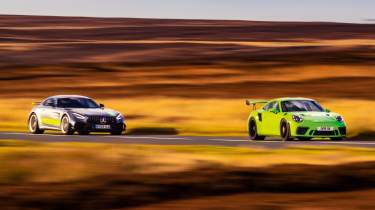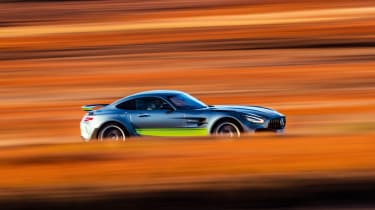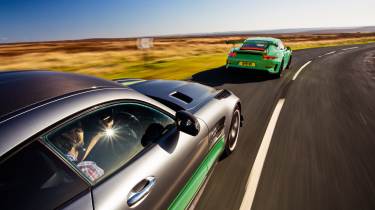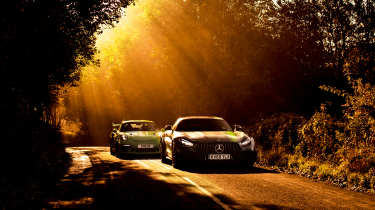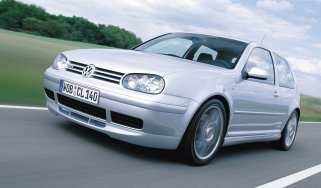Porsche 911 GT3 RS (991.2) v Mercedes-AMG GT R Pro – battle of the road-racers
The first AMG GT to wear the Pro badge was the extreme, bewinged GT R Pro. Here's how it stacks up against the 991.2-generation GT3 RS
'How many thousands of words of utter codswallop,’ says the large glass of Bordeaux up at the bar, ‘have been written by journalists about the Porsche 911 over the years? Engine’s in the wrong place, the weight balance is all wrong. And that one out in the car park is snot green. Ghastly.’
A chill draft whistles in under the pub door from off the benighted moor and the fire sparks and crackles in the hearth as a brief silence follows this somewhat forthright proclamation. I’m just considering how best to diplomatically respond to our new-found friend in tweed when he saves me the trouble, ascending a new soapbox and launching into his next monologue, taking Brexit as his tantalising theme. I briefly think about interrupting to point out that it’s actually Lizard Green, but the moment seems to have passed.
Returning to the comfort of my sticky toffee pudding, I leave photographer Drew Gibson and driver Nick Stafford to listen to the tipsy tirade (they’re closer anyhow) and instead ponder the test that lies ahead tomorrow. Much has indeed been written about the 911 over the years and some of the most fulsome (and, now I find, apparently misplaced) praise has been for ones with GT3 RS written on their rump. In fact, few cars have come close to challenging them, particularly at the price points they have occupied, but the latest challenger to Flacht’s finest is sitting in the car park outside: the Mercedes-AMG GT R Pro.
More reviews
Group tests
In-depth reviews
Long term tests
Reviews
With 577bhp and 516lb ft the Pro has more power (64bhp) and significantly more torque (169lb ft) than the RS, but at 1575kg is 145kg heavier. But the beauty of the RS has never really been in the numbers, and what the Pro promises with its new adjustable coilover suspension is the sort of tactility and interaction upon which those Porsches have built their collective reputation. Tomorrow should be a good day.
Mist is shrouding the North York moors the following morning and the dense white duvet of moisture rather suits the demeanour of the AMG. Lurking in the corner of the car park with its snake-like eyes and aggressive proportions it looks pugnacious and menacing. Swing open the lightweight door, drop down into the bucket seat and the intimidation continues. It’s a dark interior, and not simply because of the black leather tailoring. You sit low and the windscreen is not only shallow but feels far away, so your view of the outside world is a little restricted. Curiously, although you feel snug you also feel quite isolated from the passenger side of the car thanks to the layout of the AMG GT being very much front-mid-engined. With the 90-degree V8 tucked right up under the dashboard it forces the packaging of the cockpit to place the seats relatively far apart, so there is definitely no rubbing of shoulders.
It’s a curious mixture of race car on the one hand, with the seats, the cage and the slight claustrophobia, and a luxury car on the other, with the plethora of buttons on the steering wheel, the large glossy screen perched above the four central vents and the Burmester speakers. There certainly feels like there is room for an even more stripped-out Black Series version of the AMG GT in the future, but that would no doubt lift the price even further away from the GT3 RS’s.
Two colours stand out in the otherwise monochrome interior of the dormant AMG: the yellow traction control adjuster and then, when you put your foot on the brake pedal, the glowing red starter button. Press the latter and you’re treated to a guttural rumble that seems to lightly jingle your kidneys in a not unpleasant way. To set off you now need to select Drive, which is awkward because reaching for the stubby leaver makes you feel like you’re imitating a T-Rex (the short arm bit, not the roaring or overtly carnivorous bits). It must be partly due to the prominent sides of the bucket seats, but mostly it’s just the position of the gear selector, which feels like it’s behind you.
Slowly out into the mist and the Pro feels firm and reactive underneath you. The bonnet is long and broad, stretching out of sight, yet the steering is quite light and responsive. You’re again reminded that all the weight is behind the front axle so the nose can turn with startling speed. There is also a curious sensation from the rear-wheel steering at low speed, as though the rear tyres need more air in them.
The intimidation factor certainly remains when you’re on the move, especially if you venture onto smaller rural roads or through tight towns. At 2007mm wide, the GT R Pro is 127mm wider than the GT3 RS. It is also 68mm wider than a standard AMG GT, 108mm wider than an S-class, 9mm wider than a Bentley Bentayga and just 11mm narrower than a Rolls-Royce Phantom VIII. It is w-i-d-e. Although at 4551mm long it is 6mm shorter than the 911.
After a few miles along the top of the moor, we drop down out of the mist and through a village (breathe in!). Watching Nick pilot the GT3 RS through the streets I’m struck by how purposeful the RS looks even compared to the GT R. For a start, I’m sure that rear wing gets bigger every time I see one. It really does look as though it’s been pinched straight from a pitlane on a race weekend. Then there are the pressure-relieving vents over the front wheels, which have been aped by others since but, with their curved trailing edge like an apostrophe’s tail, have never been bettered for beauty – certainly not by the Pro’s rather slapped-on slits.
I’ve seen this particular RS before (it’s a non-Weissach Pack example) but the last time I clapped eyes on it there were black graphics down the side. For some reason they have been removed and I can’t decide whether I like the naked ‘Gen 1’ look more. What a relief I don’t have the money to pressure me into such tricky decisions! For what it’s worth, if I was buying a GT R Pro then I would certainly go without the sill stripes and the off-centre one down the bonnet and over the roof. There is, after all, plenty to look at already with all the carbonfibre aero addenda.
Drew wants to have a look at a potential photo opportunity, so Nick and I take the chance to swap cars. It’s quite a shock how different the 911 feels inside. The fixed-back buckets are more bespoke, but you sit more upright, as though you are in a saloon car, and the whole cabin feels airier. Older, too. Perhaps it’s because we’ve now been exposed to the 992, but this 991.2 interior suddenly feels rather dated. As with the GT R Pro, there is also still part of me that feels as though an RS should be stripped out and devoid of infotainment, but then again I guiltily like the fact both these cars feel useable and not just utilitarian.
We buzz over a cattle grid onto the sort of road where the pace would probably pick up a bit if the mist had not also returned. As raw as the GT R Pro feels, there is a tightness and toughness to the RS that instantly makes it feel more focused. It’s as though another layer has been stripped away compared to the Mercedes. It feels smaller and more wieldy too, which is no surprise, but the way they both fidget and firmly respond to the road at this sort of sedate speed is remarkably similar. Neither feels entirely happy and you begin to wonder if they are both going to be able to cope with the rough and tumble of a typical UK road at speed. Then with the abruptness of a cinematic scene change, the headlights seem to cleave through the cotton wool and present us with the glorious sight of a sunny morning and a twisting road. I hear the AMG change down a couple of gears and I find that I have already done the same. We’re about to find out.
It’s a fascinating and fantastically fun morning, switching back and forth between the two driver’s seats. What is immediately obvious is that as soon as you start to drive them quickly they feel happy. Suddenly, with greater loads going though them, the dampers start to reveal the deft control that they are capable of. The cars shrink around you a little more and yet their characters grow in stature. It’s a transformation akin to seeing Kimi Räikkönen leave a long press conference and hop straight into a wet race situation at Spa.
There’s a particularly good, flowing section of clearly sighted bends that twists through the rusty heather and both cars are brilliant here. Their response to a tricky tightening line or a wicked crest is to double down on the capability that you have felt so far, turn harder and give you more confidence. You feel wheels occasionally leaving the ground over bumps, but such is the connection with the cars that the unweighting isn’t unnerving. You feel totally at the centre of both vehicles, a part of the process. To that extent I would love to have the optional harnesses in both cars, just to remove any last elements of slack.
There is certainly no slack in the Mercedes’ brakes. In fact the huge carbon stoppers feel a little too eager at times, with an over-servoed feel that can make them hard to modulate. There is certainly no lack of power and they feel OK if you are simply smashing the pedal as hard as you can, as you would on track, but on the road it can make a more nuanced approach to corners tricky.
What about once you’re into a bend? I think the perfect corner in the Mercedes is long, with a relatively constant radius and probably taken in third gear. Ideally it will be well sighted too, because you want to commit the front end early. Tip that long bonnet quite aggressively into the corner with the quick steering, loading up the suspension and transferring the weight to the outside rear wheel. For best effect this would be a left-hand bend in a right-hand-drive car and vice versa, as it means the driver gets the best sensation of sitting right on top of the wheel that is taking the strain.
Once you’ve got the Pro set like this it is a glorious feeling, because the nose seems to stay easily locked onto a tight line and you can just adjust the angle of the car through the length of the corner using the throttle pedal. With the diff locked and the car leaning into the sidewall of the 325-section Cup 2 you can just tease it constantly, managing the slip on a seemingly microscopic level, all the little variations in grip being transmitted directly to your backside. The longer the corner, the greater the chunk of time you get to enjoy this wonderful sensation.
There are a few things specific to the Pro I’m sure AMG would claim help this sense of precision and connection. First is the carbon panel on the underbody at the rear, which increases the rigidity of the bodyshell. Second is the rose-joining of the upper wishbones at the rear (the lower were already rose-joined for the GT R). Third is the recalibration of the dynamic engine and transmission mounts. If it’s one or all of these, the end result is terrific.
One of the wonderful things about the GT3 RS is that your interaction with a corner starts the moment you turn the wheel. That might sound like a truism, but a 911’s balance is such that you feed the front end into a bend in a way that few if any other cars ask you to. Yes, a modern RS has incredible bite and response from the front tyres, but the engine remains in the rear and so you still subtly tease and coax the nose into a corner, certainly when driving quickly. This is why steering feel is so vitally important in a 911, because so much of its magic lies in your assessment of grip through the front tyres in these moments.
Such is the traction that on the road in the dry you won’t be spinning up the Porsche’s N-rated version of a 325-section Cup 2 in the same way you do in the GT R. However, that’s not to say you don’t work the rear end. It’s just that rather than focusing all your attention on the throttle and the back of the car as you do in the GT R Pro, you tend to work the whole of the GT3 RS through a corner. From turn-in to apex and then exit there feels like there is adjustment available at every stage of the Porsche’s trajectory.
Then as the road straightens, your focus returns to the engine. In isolation the Mercedes hot-V turbo motor feels incredibly keen – it is incredibly keen – but it doesn’t take anything more than a brief acquaintance with the Porsche’s four naturally aspirated litres to know that the RS is another level of alert. The Mercedes’ thumping torque is addictively muscular and shrugs off the slight extra bulk, but its delivery, although impressive, is like the soundtrack that accompanies it.
I don’t have synaesthesia (or chromaesthesia to be precise), but it has always fascinated me and if I were to imagine the noise the twin-turbo V8 makes as a colour then I think it would be a deep but vibrant red. It is a really lovely colour; warm yet exciting. However, the exhausts only produce that one colour in varying volumes. A sample pot at tickover, then a whole swimming pool of the stuff under full throttle.
By comparison, the GT3 RS has a full autumnal palette, the colours morphing sometimes quite suddenly from one striking shade to another as you climb through the revs. It’s a dizzying kaleidoscopic ride if you choose to hold the throttle down all the way and keep pulling gears. Sometimes it’s nice to short shift and immerse yourself in one particular shade, a bit like lingering and looking at an Yves Klein painting, but there is always variety available with a change in angle of the throttle pedal.
Then there are the brief bursts of colour that the PDK gearbox adds into the picture. Depending whether you are changing up or down a gear and how much load there is, you get very different results. I’m slightly obsessed by the satisfying noise that occurs when you change down at around 2000rpm. It’s (and I’m afraid I shall have to leave the hues behind at this point and revert to more regular sound similes) a sort of combination of the thud made when a big firework launches and the hollow phut you get from taking the lid off a nearly empty tube of Pringles. And the nice thing about this is it occurs at such low revs it’s available for your auditory amusement almost whenever you want.
By the end of the day we have traversed the length and breadth of the moors, investigating almost every type of road they have to offer. Running south along the wide open ridge that could have been the deepest valley for all the view it afforded this morning, we are now treated to a spectacular sunset to our right. They burn patches of heather up here to maintain the habitat and for all the world it looks as though one of these fires has got wildly out of control and is lighting up the clouds. The road swings right momentarily and I decide to go for the Ari Vatanen Pikes Peak salute rather than bother putting the sun visor down.
I love these sorts of cars, ones that evince excitement and a dedication to driving from the moment you get in. Cars that make you feel alive. Earlier in the year we had a group of them up in Scotland for the cover story of issue 262 (Ferrari 488 Pista, McLaren 720S Track Pack, Lamborghini Aventador SVJ and this very Porsche) and it’s interesting to think how the GT R Pro would have fitted into that quartet. Exceptionally well, is the conclusion that I reach. For a start, at £188k it would have been cheaper than everything there bar the GT3 RS, making it look very good value. I also think that it has more than enough presence to hold its own amongst the mid-engined crowd in a car park.
But just as there was no denying that the 991.2 GT3 RS was the best on that test, so the Porsche retains its crown in this duel. It is simply the definitive road racer of its generation. And the way that the Pro demolishes a road is tremendous too, with steering that is almost as sharp as a Pista’s, a ride that has the same toughness as in a GT3 RS and an SVJ, and a responsive rear end that is all its own.
So there we are: a few more words to add to the reams of ‘codswallop’ written about the 911. I know not everyone buys into the 911 thing. I do understand that the rear-engined balance isn’t for all, but I defy anyone who has driven one, even those who ultimately prefer a pointier front end or more playful rear, not to be blown away by the other parts of the package. The feel through the steering, the soundtrack provided by the flat-six, the response to the throttle, the sense of connection to the road through the suspension. Its refined rawness is simply beautiful to be at the centre of.
However, if you prefer adjustability predominantly measured through the medium of slipping rear tyres then the GT R Pro is a mightily appealing alternative in this road racer genre.

